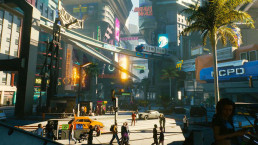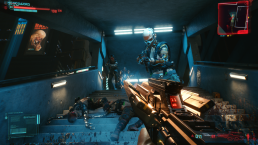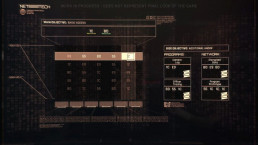It's hard not to dwell on the beautiful images that Cyberpunk 2077 constantly presents you. Night City, the city where most of the game takes place, feels alive and very real. The architecture, the horizon: it looks like a city with a history. A city where buildings and streets are built on the remains of previous constructions, and where roads and alleys wind organically around existing structures.
The way the story is propelled, whether in the main mission or in the many, many optional side missions, is fantastic. Conversations give you information organically, and during those conversations you make choices that actually affect later events and even the end of the game. The choice of your life path as the mercenary V , Corpo, street rascal or Nomad, at the start of the game not only determines how the game starts for you, but also gives you dialogue options that suit your background.
Just like in most modern RPGs, completing a mission consists of several stages, in which you have to make all kinds of choices. Many missions consist of “heists”, complicated infiltrations where you stealthily, fight or hack to reach a goal. You decide how to tackle a problem at any time. For example, it is often possible to complete missions without firing a shot, which is not only blood-curdling, but also very satisfying. You use your common sense instead of your weapons. However, if you just want to knock things over, you can of course do as you please.
Finally, hacking is primarily a useful tool that adds an interesting puzzle element to confrontations with enemies. The hacking itself is not very challenging, it’s in fact nothing more than a kind of maze that you have to solve by selecting letter-number combinations before the time runs out. Once something or someone is hacked, on the other hand, new doors open to deal with a situation.
Somewhere early in the game, a gigantic, heavily armed cyborg, for example, seemed almost impossible to defeat. But by hacking him before the fight, there was suddenly the option of either blinding him, making his giant arm cannon a lot less effective, or knocking out half of his life meter with a powershortage.



Fighting as well as sneaking are not without problems. Well, “problems” may be a bit heavily phrased, but Cyberpunk 2077 is pretty forgiving on that front. When an enemy spots V, you have a few seconds to move out of sight again. Which is remarkable, given that the vast majority of opponents have cybernetically enhanced eyes.
The same is true to some extent for gunfights. You can do a lot of damage even in the beginning of the game and it is by no means always necessary to move tactically from cover to cover to win a fight. In fact, when an enemy is hiding behind a pillar, it’s a lot more effective to run up to it and shoot a shotgun in the face a few times.
Fortunately, that tactic doesn’t always work, and when there are many enemies in the area, it’s certainly possible to quickly go “flatline”, Cyberpunk 2077’s version of a game over-screen. Which also immediately causes another minor annoyance: checkpoints do not always make sense. For example, in a given mission, the game saves before a long dialogue scene, which is followed by a spirited firefight. So it is not possible to manually save the game during a battle or a dialogue. Having to go through the same scene with interactive options multiple times therefore diminishes its emotional impact.
Fortunately, there is a feeling of excitement and fun during most of the game. Especially when the first act is over and you meet Johnny Silverhand, the virtual rock star who is suddenly implanted in your brain due to circumstances. Johnny acts as your side kick in the same way that The Joker was in Batman: Arkham Knight. He shows up to comment on you and the situation and usually acts like an amusing bastard.
It’s also thanks to Johnny that Cyberpunk 2077 elevates itself to a game that truly belongs in the cyberpunk genre. Because to be “real” cyberpunk, it is not enough to create a technological city with implants and virtual reality. The great strength of the genre is that this dystopian vision of the future poses interesting questions about what it means to be a human, and about life and death. And especially by adding alienating elements. The character Johnny, played brilliantly by Keanu Reeves, is the epitome of those traits. From the moment Johnny gets into “your” head, Cyberpunk 2077 transforms from “a game of cyberpunk decoration” to something with a strong identity of its own.



Cyberpunk 2077 is basically a standard role-playing game with stats, levels, skill upgrade points and a quest log full of missions that you collect along the way.
Missions are classified by “danger level”, which basically shows if your level is high enough to survive them. There are extremely many of these side missions to be found. Of course, there are a lot of trivial activities, such as taking out criminals for their bounties or collecting objects, but many of the “real” side missions are just as extensive and full of surprises as the main story. In that respect, we again see the philosophy of the studio that brought us The Witcher 3: side missions are actually the reason to play. The main story itself is not very long. It is possible to complete it in twenty hours by ignoring most of the side paths.
Although there is a certain routine in tackling missions (sneak, fight, hack your way through a location) the game isn’t predictable. In addition to the fact that later upgrades change your playing style substantially, there are also all kinds of trips that refresh things considerably. Trips such as an underwater mission and various “brain dances”, where you step into a memory and play a kind of mini adventure game to collect clues, provide plenty of unpredictability. Most missions also have certain surprises, where you suddenly have to solve a puzzle unique to that mission.
The game did not crash with us, but there are some small bugs. The day one patch should fix a lot, and given the extensive support for The Witcher 3, it’s not unreasonable to expect Cyberpunk 2077 to be near bug-free in a few months. Which makes it feel like it might be a bit of a shame to play the game right now. But yes, the hype and all that. This is such a game that many people look forward to and want to get into as soon as possible.
Hype is a bad counselor. Looking forward to a game for eight years will give that game a mythical status that it can never live up to. That doesn’t mean it is bad. Cyberpunk 2077 is a really, really good RPG in a great world.
Score:
9,0
+ Lots of variety
+ Lots of good story missions
+ Great graphics
– Unnecessary bugs